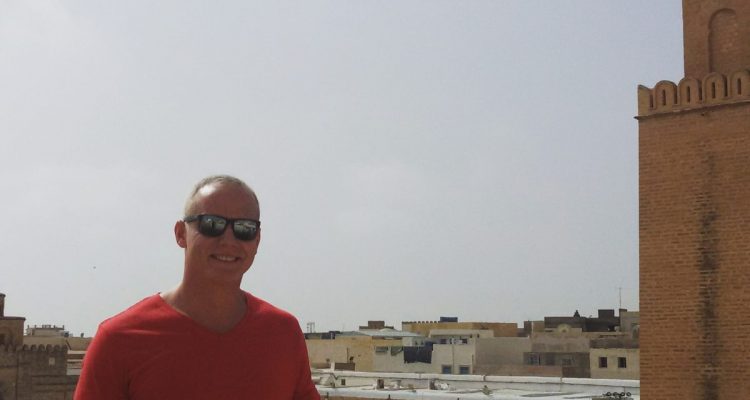Francis Estrada is an American installed since 2010 in Tunisia. Having lived in Tunisia a few years being small, he has always kept very good memories. He is a lover of Africa and Tunisia in particular. Since 2010, he has been working as a business and security consultant. “Africa, I visited several countries of the continent. Some before a coup and others after, “he told me. Interview with Francis Estrada.
leconomistemaghrebin: can you introduce yourself and tell us about your career?
Francis Estrada:
I come from Seattle, Washington, in the United States. I studied criminal justice and corporate management at Bellevue College.
In the United States, I served in the US Army for four years and then worked for 14 years as a police officer in the Seattle Police Department.
Then in 2010, a combination of circumstances brought me to Africa and specifically to Tunisia. I had the chance to witness the Tunisian revolution. A unique moment for this country that I love.
Right after, from 2011 to 2013, I worked for the African Development Bank (AfDB), as a logistics security consultant.
My job was to manage the bank’s physical and intellectual security issues. I had to protect the bank’s staff, as well as visiting consultants and sensitive banking information.
Unfortunately for me, the bank moved to Ivory Coast in 2013 and I did not want to follow them. Because I had just married and I wanted to spend as much time as possible with my wife and my family in Tunisia.
So, I had to change jobs and since then I have been working for an American company, the Subsaharian Solutions, specializing in security consulting.
And what was your last job at “Subsaharian Solutions”?
These are companies that were either looking to grow or to start a business in Africa. I did the security assessments to tell them if the business climate was good or bad. And if they already had an established business, I had to give them recommendations.
Each customer is different and has different requirements. But it was interesting to visit several African countries and to learn new cultures. I visited about 20. It was really a nice experience for me.
Of course, what has struck me the most in Africa is poverty and income disparity between the poorest and the richest. It’s sad to see that. At the moment, I’m still working for this company, but I travel less often.
Which African country has impressed you the most?
One of my favorite countries is Ethiopia. He has had a huge financial boom in recent years. But I was there before it all started. It’s impressive! I like to visit Ethiopia, because there the service is quality and the employees always have a kind word for you. In most countries where I went to Africa, you can not imagine the quality of services. Outstanding!
In the Maghreb is it different?
I visited all the Maghreb countries. In Morocco, the service is good. Tunisia is obviously not like that. This culture of service does not exist, employees are less conscientious. But I think it is improving especially with the influx of new businesses and the change of mentality.
Egypt is between Morocco and Tunisia. In Morocco, they know that if they do not do their job, they will be fired and the more satisfied the customers, the higher the tip.
Do you think it’s our education, our mentality or our vision of service that needs to change?
I think these are both.
Look at the way people drive in Tunisia. Is it a mentality to burn red lights? It’s just because there is no police force to enforce the law.
If the Tunisians knew they would be punished, they would not drive like that. So it’s an education to have from an early age. For the service sector, we need rigor and not let-go because customers see it. You know I hear a lot of Americans say in Tunisia: “The food was good, but the service is poor, so I will not go back.”
Finally, in the last two years, I had projects that did not succeed because customers did not want to invest in Tunisia.
Honestly, it’s hard to do business here. In terms of regulation, try to ask the same question to three different people, you will get three different answers. And it’s like that for everything here. It is frustrating for American companies not to have a clear and precise answer. We are rational.
Do you think that if we change our regulations, the Americans will be able to invest more here?
I think so. Today, the process is very slow. To settle in Africa, an American company will analyze the costs and time for starting a business and the profits it will make. Here, start-up costs are higher than in other countries.
Tunisia is a beautiful country that has a lot to offer. It is calm and secure, but if you can double your profits elsewhere, you do it.
It’s a shame because Tunisia has a good foundation. Good infrastructure and a high academic level. Just rationalize some things. The future is very promising for Tunisia.
And to conclude ?
I would say that the biggest frustration I see in Africa is that people often have no chance of succeeding because of lack of opportunities and financial means.
It also seems that Africans have stopped dreaming or have not even begun. So if you could give people more chances to succeed and the opportunity to dream of a better future, it would be better for everyone.
Article by Fatma Tnani, in partnership with the Maghreb Economist


Leave a Reply